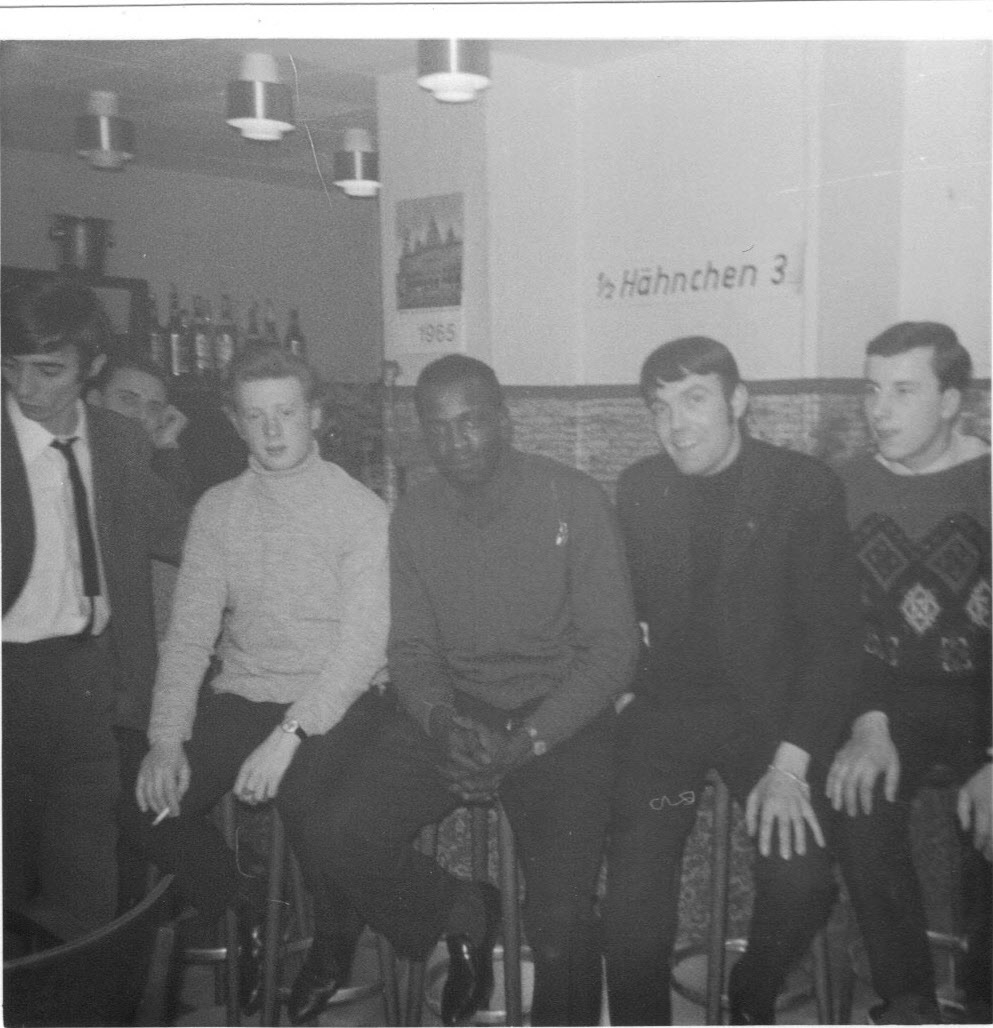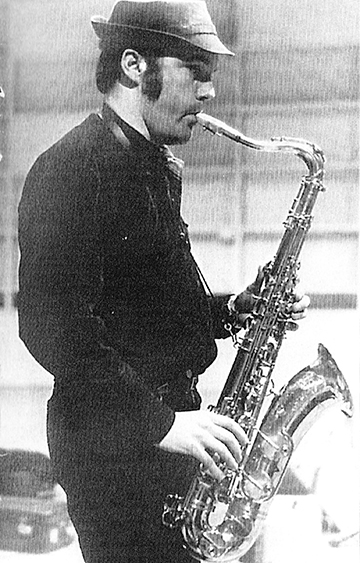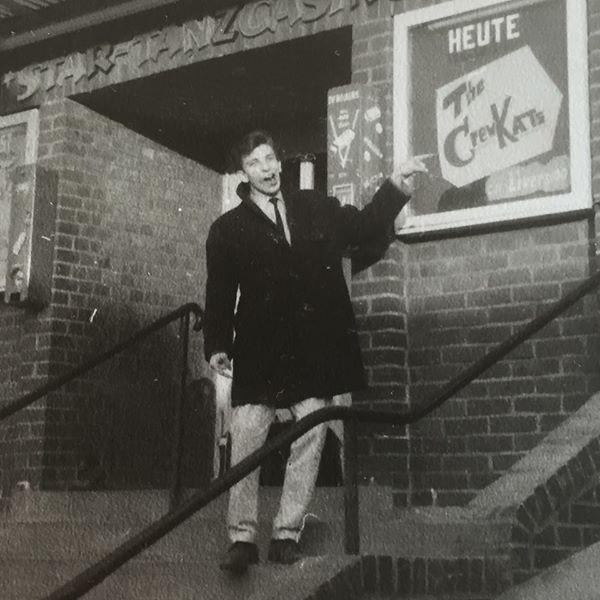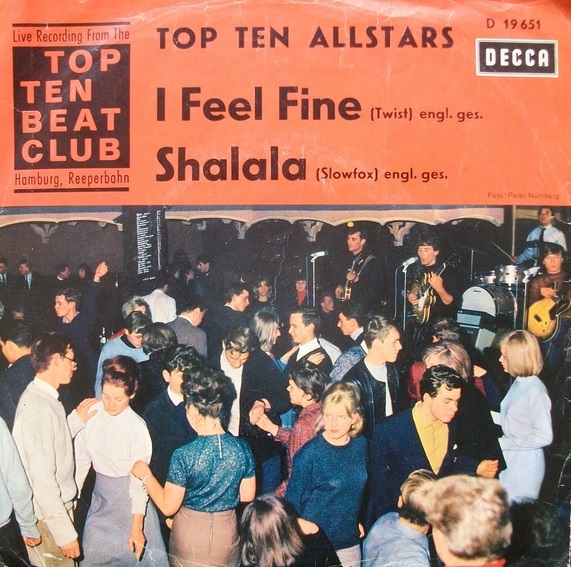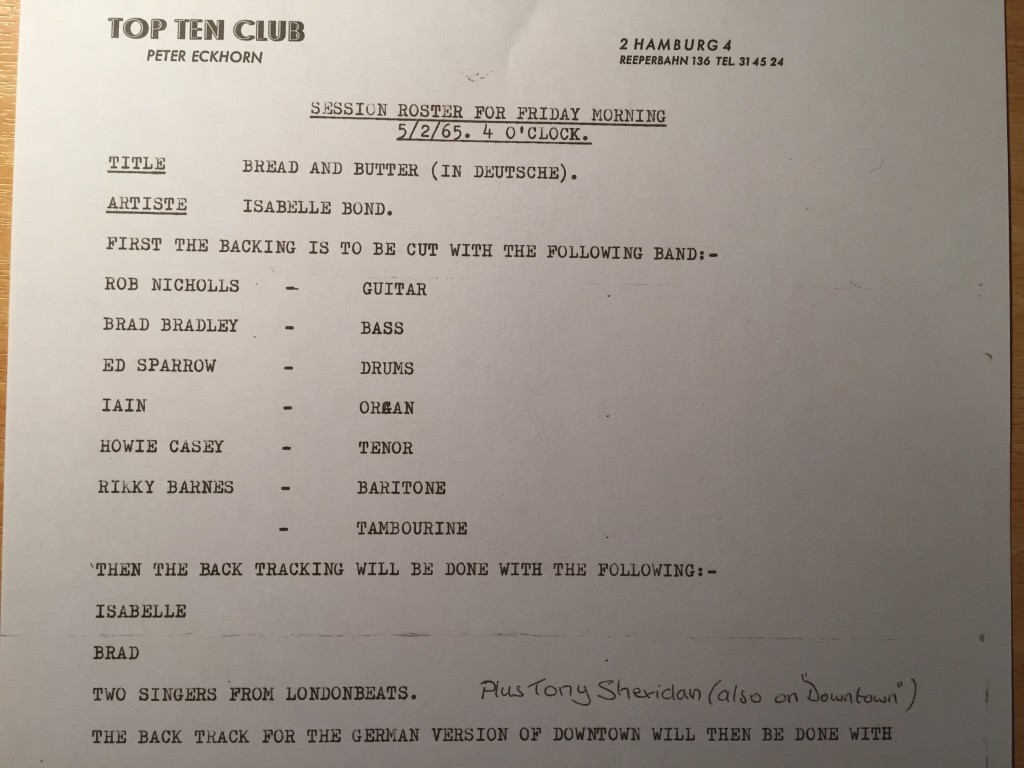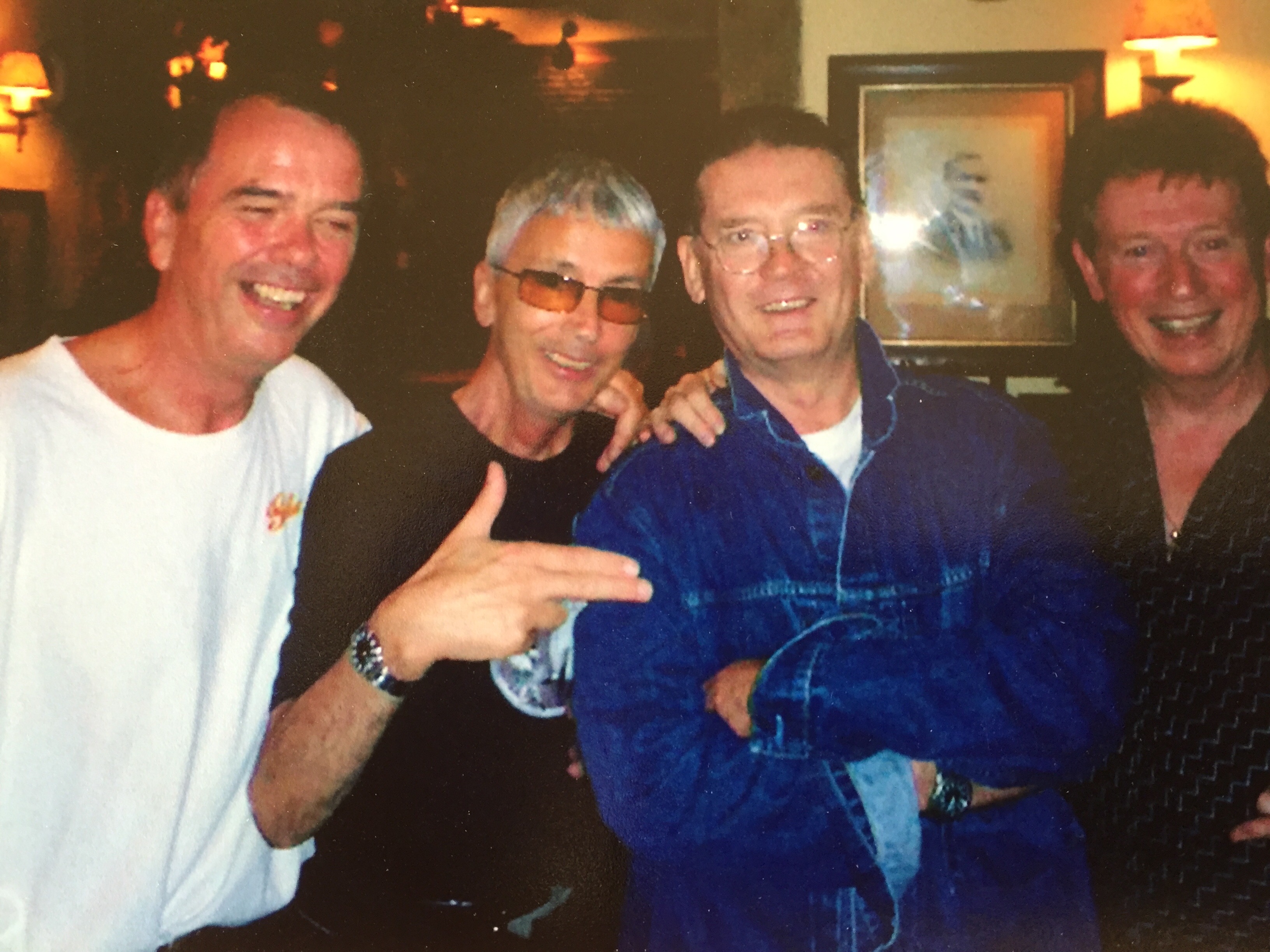By Nick Warburton
For the first few months of 1964, The Krewkats remained in Hamburg but with little work on the horizon, the musicians decided to return to Paris to work with Dick Rivers again. On the way to the French capital, they landed a gig at the New York City Club in the heart of ‘the Ruhr’ Germany where they ran into sax player Howie Casey, playing with Liverpool band, The Pawns.
The Krewcats at Kitty’s Bar, Itzehoe, early January 1965 – Mam Hourie (tenor sax), a German fan, Robert Fielden-Nicholls, Aron (an American USAF Captain who often visited the band), Howie Casey (tenor sax) and another German fan
A seasoned musician with an impressive musical pedigree, Casey had started out with Derry & The Seniors in November 1959.
“My band was the first Liverpool band, Derry & The Seniors, later to become Howie Casey & The Seniors, to go to Hamburg in [the summer of] 1960,” he claims.
“We’d gone down to London to have a blow at the Two I’s and the owner of the Kaiserkeller [Bruno Korschmeider] was over and just happened to be in the coffee bar when we went on and played. He was looking for a band to take the place of Tony Sheridan & The Jets.”
Back home in Liverpool in late 1960, Howie Casey brought in singer Freddie Starr after Derry Wilkie left and changed the band’s name to Howie Casey & The Seniors in January 1961. The group played in UK and on the continent for the best part of a year and a half. Then, in the summer of 1962, Casey jumped ship after being invited by bass player Bobby Thompson to join King Size Taylor & The Dominoes.
While with The Dominoes, the band backed Chuck Berry on his debut UK tour and then headed back to Germany to hold down a residency at the Star Club in late 1963. By January 1964, however, Casey was back in Liverpool. Not long after, he accepted an offer to join local outfit, The Pawns who had a gig at the New York City Club in Duisburg, taking over from the outgoing Krewkats.
Howie Casey (from beatlesbournemouth.blogspot.co.uk)
Immediately, the sax player sensed that something wasn’t right about the booking and when the opportunity was presented to join The Krewkats, he jumped at the offer and travelled on to Paris with the group to work with Dick Rivers. However, Casey maintains that it wasn’t a positive experience. “The work that he promised didn’t come to fruition”.
By this point, Ted Tunnicliffe had departed the band, as the guitarist recalls: “I got sick in Duisburg and was ‘repatriated’ to France, where I joined France Gall’s backing band, Les Francais, which started my career in France.”
While Tunnicliffe dropped out of the band at this point, he would reunite with Eddie Sparrow and Howie Casey in The Krew in late 1966.
Meanwhile, the Paris-based Krewkats took on another tenor sax player Gérard Rinaldi, the driving force behind an amusing French group called Les Charlots.
When the band found out that Dick Rivers was planning to replace them with Mick Jones’s band, The Gladiators, the musicians went out on their own and even made some further recordings for Pathe Marconi, which were not released at the time, including a cover of The Kinks’ “You Really Got Me”.
Then, in December, The Krewkats (with new tenor sax player Mamoud Hoaurie) landed a gig at the Pferdestall, the Star Tanz Casino, in Itzehoe in northern Germany, which turned into a disaster. In the early hours of the morning of New Year’s Day, 1965, the club burnt down in what many suspect was a deliberate act by the owner, hell bent on an insurance scam.
Eddie Sparrow at The Star Tanz Casino
Robert Fielden-Nicholls remembers the incident well. “We had a night off, but we walked up the road where the club was situated and we saw a lorry. I am talking about a period of darkness, way after business hours, and they were loading things into the van, not out of it. We’d had a few drinks by then and thought, ‘That’s a bit odd’, walked up the road and said ‘hi’ to the two guys that ran the club and walked on.
“The next morning we heard the whole thing had burned down. We thought, ‘That doesn’t take too much working out does it?’ We lost a lot of equipment in that fire. I had to borrow a guitar. I think our amps had gone. We lost two tenor saxes, my Gibson ES335, a Gibson EB2 bass and much more.”
In the ensuing blaze, Sparrow’s drum kit had also been badly damaged and with little or no equipment left, the musicians returned to Hamburg where Peter Eckhorn helped the musicians out with a month-long residency at the Top Ten Club in February 1965, backing Scottish singer Isabella Bond.
Using borrowed equipment, the renamed Top Ten All Stars briefly augmented the line-up with American trumpet player/tenor sax player Johnny Philips (who was a character in his own right) from Liverpool band, The Roadrunners and their old friend Iain Hines on Hammond organ. Also on the bill that month was Surrey band, The London Beats and Liverpool singer Beryl Marsden, backed by The Eyes (aka Paddy, Klaus & Gibson).
The Krewcats, Top Ten Club, Hamburg early 1965
During their Top Ten Club residency, Casey and Sparrow befriended keyboardist Alan Reeves, a Southeast Londoner, who was working with Jarrow band, Shorty & Them at the nearby Star Club. Reeves would reunite with both musicians in a new version of The Krew in October 1965.
During the February residency, a bunch of the musicians from all three groups backed Isabella Bond on two recordings – “Bread and Butter” and the Petula Clark hit, “Downtown”. Issued on the German Decca label, the single was credited to Isabella Bond & The Top Ten Allstars.
They also cut a version of The Beatles’ “I Feel Fine” with John Bradley on lead vocals backed by “Sha-La-La”, which was released on German Decca under the Top Ten Allstars name.
However, with the residency completed and the club about to be closed for refurbishment, the musicians decided to return to England with the intention of breaking into the US market.
“The plan was that when we came back from Hamburg, we were going to regroup in London,” says Fielden-Nicholls.
“Johnny Phillips, who was a lovely fella, unfortunately tried to bring an underage German girl in to the country and I think [he later] got booted back to California. But the plan was that we were going to regroup and go the States. Things fell apart. Mamoud didn’t have a visa, so he [later] got shoved back to France.”
Travelling back to England with Mick Tucker from The London Beats, the guitarist had other reasons to rue the end of the band and its American ambitions.
“I made the biggest mistake of my life in who I got married to,” he says looking back. “Having been engaged while I was out in Hamburg, I went home back to Leamington Spa where she lived. I kinda lost touch with my muzo friends, I didn’t even have a guitar remember.”
With a burgeoning soul scene emerging in Leamington Spa/Warwick, Robert Fielden-Nicholls, who locally bought a 335 copy and borrowed an amp, briefly joined up and coming band, The Art Soul Six (soon to become Soul Concern) but it proved short-lived. When the group decided to go professional, the guitarist was forced to bow out in August 1965.
“I’d only been back about three days and an old friend came round and said, ‘We are forming a band and we need a guitarist’. My then fiancée sort of looked sour at it and she said, ‘You’ve just had enough of that, haven’t you? You don’t want to do that’. But I joined the band anyway.”
Since 2001, happily remarried to singer/guitarist Sylvie, Fielden-Nicholls has returned to playing guitar and currently performs in three very contrasting bands – Eddie Martin & His Rhythm Cruisers, a ‘50s rock ‘n’ roll quartet, Boperator Boogie Band (a seven-piece boogie blues/jump-jive outfit with his wife) and the reformed Birmingham based, Soul Providers.
Krewkats 2008 reunion, from left to right: Ted Tunnicliffe, Ralph Danks (old Star Club ’62 friend) Don Hawkins and Robert Fielden-Nicholls (photo from Robert Fielden-Nicholls)
Interestingly, Robert Fielden-Nicholls and Ted Tunnicliffe were involved in a brief Krewkats reunion in summer 2008 with former drummer Don Hawkins and guitarist Ralph Danks and the quartet played a gig in Leamington Spa.
Back to March 1965 and Howie Casey, John Bradley and Eddie Sparrow re-located to Casey’s hometown, Liverpool, where the tenor sax player knew he could secure work for The Krew (as they would become after a very brief period using The Krewkats name).
“I remember sleeping the first night back in the Blue Angel,” remembers Sparrow. “I also remember that morning Howie discovered that the beer taps had been left on. Liquid breakfast, but not for me as I hated booze at the time.”
The drummer explains that the club’s owner was a friend of Casey’s and helped the musicians out by booking The Krew into the Maggi May club during March 1965. By this point, the trio had been joined by guitarist Mike Hart, who’d also just returned from Hamburg playing with The Roadrunners.
“I did the month there on hired drums from Jones & Crossland, Birmingham. I then went back to Harrogate where it took me all of the summer to get my drums repaired and earn the money to pay for the repairs,” continues Sparrow. “There was no possibility to buy anything new. I was financially broke.”
According to Manfred Kuhlmann’s excellent book on the Liverpool music scene, Beat Waves ‘Cross the Mersey, Howie Casey and John Bradley kept The Krew going briefly by adding drummer Pete Clarke from The Escorts and then Chris Mutch, who took over when the former left to join Them Grimbles.
Drawing on Kuhlmann’s impressive research, it appears that Casey and Bradley decided to put The Krew on hold during April-May 1965 when they both joined legendary Liverpool band, The Big Three.
In July 1965, the pair briefly parted and while Bradley played bass with The Jam Buttees, Casey hooked up with The Griff Parry Five, featuring singer Steve Aldo, who would co-front The Krew later that year with the aforementioned Beryl Marsden.
By mid-August, however, Casey and Bradley had got back together and relocated to London to form a new version of The Krew. The pair had even recruited a new lead guitarist, Tommy Murray, a former members of Liverpool bands The Memphis R&B, and, more significantly, The Kinsleys.
“Howie phoned me from London and told me about [manager] Tony Stratton-Smith and asked if I would like to go down and join Brad and himself and reform The Krew,” remembers Sparrow.
“I shall be eternally grateful for that call. Without it, I do not think I would have got back into the business and consequently worked with all the people that I did.”
However, soon after arriving in London, Sparrow discovered that John Bradley had decided not to become part of the new version of The Krew and had briefly landed some work with The Animals’ former keyboard player Alan Price, pre-Alan Price Set.
For some reason, that didn’t work out and after briefly playing a couple of gigs with John Mayall’s Bluesbreakers (playing alongside Eric Clapton) that December, John Bradley bowed out of the business.
“Brad wanted out so he left and I pulled in Archie Legget who I knew from Bobby Patrick & The Big Six,” explains Casey. “They were playing opposite King Size Taylor at the Star Club in the house band [back in October 1963].”
With Legget completing The Krew line-up alongside Howie Casey, Tommy Murray and Eddie Sparrow, the band’s manager Tony Stratton-Smith linked the musicians with Liverpool singers Beryl Marsden, and Casey’s former cohort from The Griff Parry Five, Steve Aldo, who had been fronting his own outfit, The Steve Aldo Quintet during July-August 1965.
https://www.youtube.com/watch?v=L8aQitwJNdA
Video: Beryl Marsden – Everything is Gonna Be Alright 1966 – with Johnny B. Great & The Quotations
It was the start of a new chapter in The Krew’s fascinating history.
I’d like to thank the following people for helping to piece together the band’s long and tangled history: Robert Fielden-Nicholls, Ted Tunnicliffe, Eddie Sparrow and Howie Casey. Thanks to Robert Fielden-Nicholls and Ted Tunnicliffe for the photos.
Copyright © Nick Warburton, 2015. All Rights Reserved. No part of this article may be reproduced or transmitted in any from or by any means, without prior permission from the author. To contact the author, email: Warchive@aol.com or nick_warburton@hotmail.com
